Introduction
Sobriety is a journey full of rediscovery and self-improvement. For many recovering from addiction, finding joy and fulfillment without substances is a significant challenge. This article explores practical strategies to cultivate happiness, build meaningful connections, and embrace a healthier lifestyle as part of the recovery process.
The Foundations of Happiness in Recovery
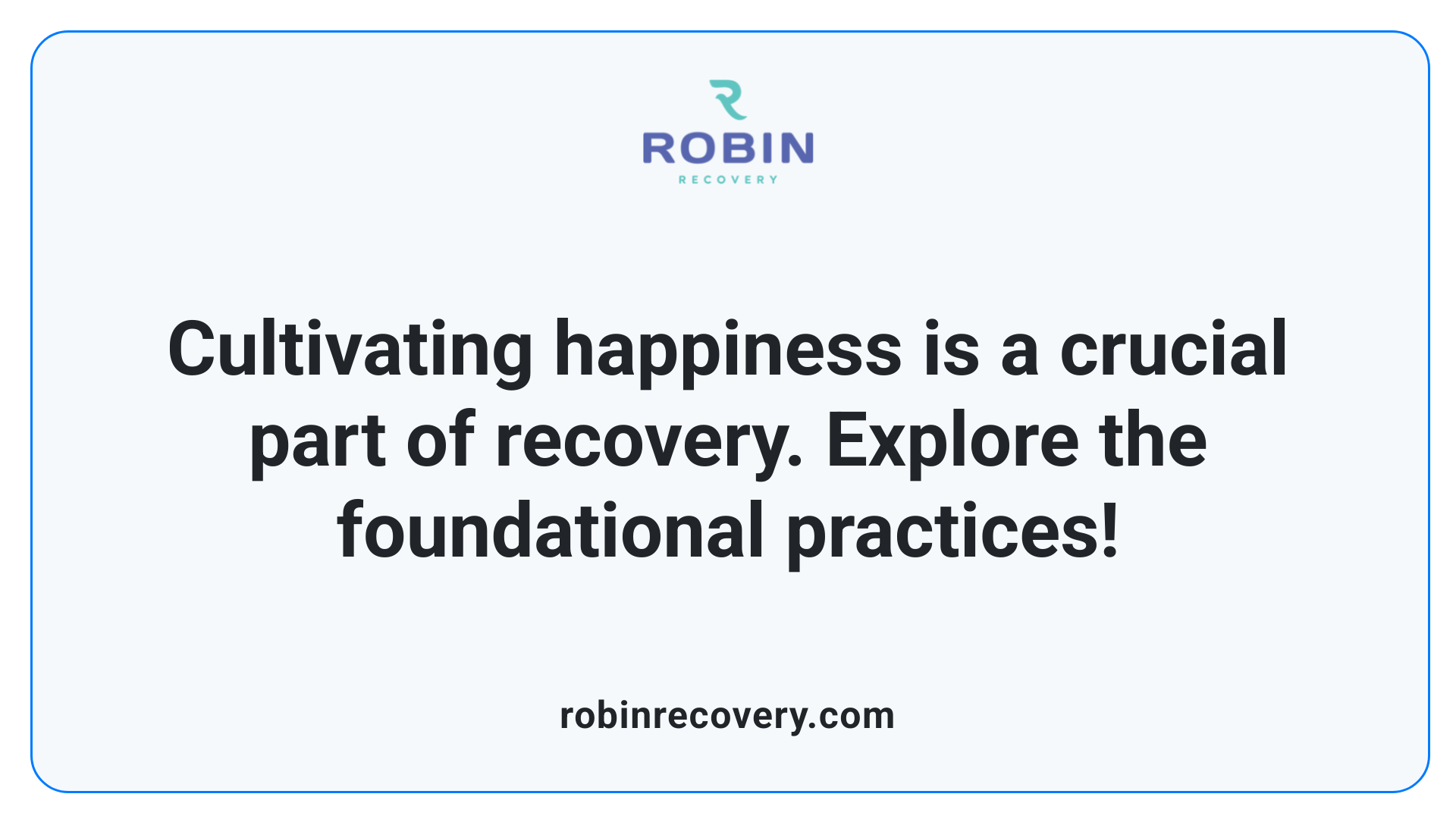
How can happiness be cultivated in recovery from addiction?
Happiness can be cultivated in recovery from addiction by adopting a holistic approach that emphasizes self-care, social connections, and positive thinking. Self-care practices are vital; these can include maintaining a balanced diet, regular exercise, and adequate sleep, all of which have been shown to significantly improve mood and overall well-being.
Importance of self-care in recovery
Practicing self-care involves recognizing one's physical and mental health needs. Activities such as mindfulness and meditation can enhance emotional resilience, helping individuals manage stress during early recovery. Additionally, reconnecting with enjoyable hobbies and interests fosters emotional fulfillment and reduces feelings of boredom—an important factor as boredom can trigger relapse.
Building social connections
Forming meaningful social connections is crucial in fostering happiness. Engaging in recovery groups, such as Alcoholics Anonymous or SMART Recovery, provides individuals with a community of shared experiences and mutual understanding. Friendships developed in sober environments can increase a sense of belonging, which is essential for mental well-being.
Practicing gratitude
Practicing gratitude is another powerful tool in recovery. By recognizing and appreciating the positive aspects of life, individuals can uplift their emotional health. Keeping a gratitude journal or sharing moments of appreciation with others can help shift focus from what is lacking to what is present and fulfilling.
Celebrating recovery milestones
Finally, acknowledging and celebrating milestones in recovery is vital. Documenting successes, big or small, helps individuals track their journey and recognize personal growth. Sharing achievements with supportive peers can enhance motivation and foster an environment of encouragement and joy.
| Components of Happiness in Recovery | Practical Strategies | Emotional Benefits |
|---|---|---|
| Self-Care | Regular exercise, mindfulness practices | Improved mood, stress reduction |
| Social Connections | Join support groups, reconnect with loved ones | Enhanced sense of belonging |
| Practicing Gratitude | Keep a gratitude journal, share positive moments | Increased positivity in outlook |
| Celebrating Milestones | Document achievements, share successes | Boosts self-esteem and motivation |
Happiness in recovery is a cumulative process requiring consistent effort and the adoption of healthy practices.
Strategies for Joyful Living Without Substances
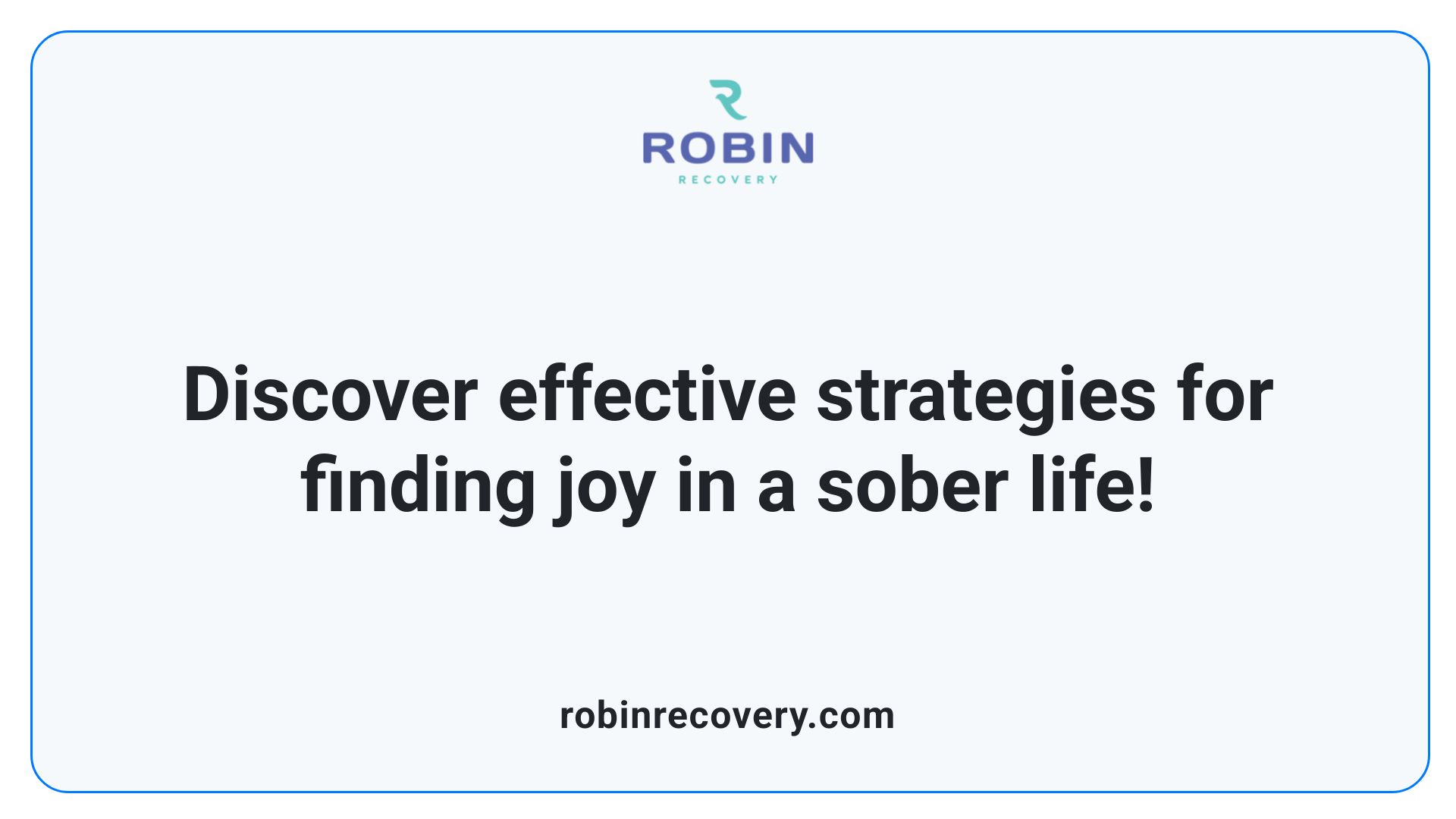
What are some strategies for finding joy in a sober life?
Finding joy in a sober life involves several key strategies.
Invest in Relationships
Surrounding yourself with positive, happy people can significantly enhance your mood. Building a supportive network, whether through family, friends, or recovery groups, fosters social support that is vital during recovery.Practice Gratitude
Recognizing and appreciating the good in life can vastly improve mental health. Cultivating gratitude allows individuals to shift their focus from what's missing to celebrating everyday joys, reinforcing a positive outlook.Set Meaningful Goals
A sense of purpose can boost happiness. Setting achievable goals or engaging in meaningful activities can enhance self-esteem and provide direction. Whether it's personal, professional, or creative, goals serve as benchmarks for progress.Live in the Moment
Embracing mindfulness encourages savoring daily pleasures. Taking the time to enjoy small moments, such as the warmth of the sun or a favorite meal, can contribute to greater contentment during recovery.
More on Joy in Sobriety
Table of strategies to find joy:
| Strategy | Description | Benefits |
|---|---|---|
| Invest in Relationships | Build connections with happy and supportive individuals | Enhances mood and provides support |
| Practice Gratitude | Recognize small joys and positive aspects of life | Improves mental health and outlook |
| Set Meaningful Goals | Establish achievable objectives | Builds self-esteem and direction |
| Live in the Moment | Focus on present experiences | Increases joy and appreciation of life |
Implementing these strategies can guide individuals towards a rich and fulfilling sober life, enhancing overall well-being.
Understanding the First 90 Days of Sobriety
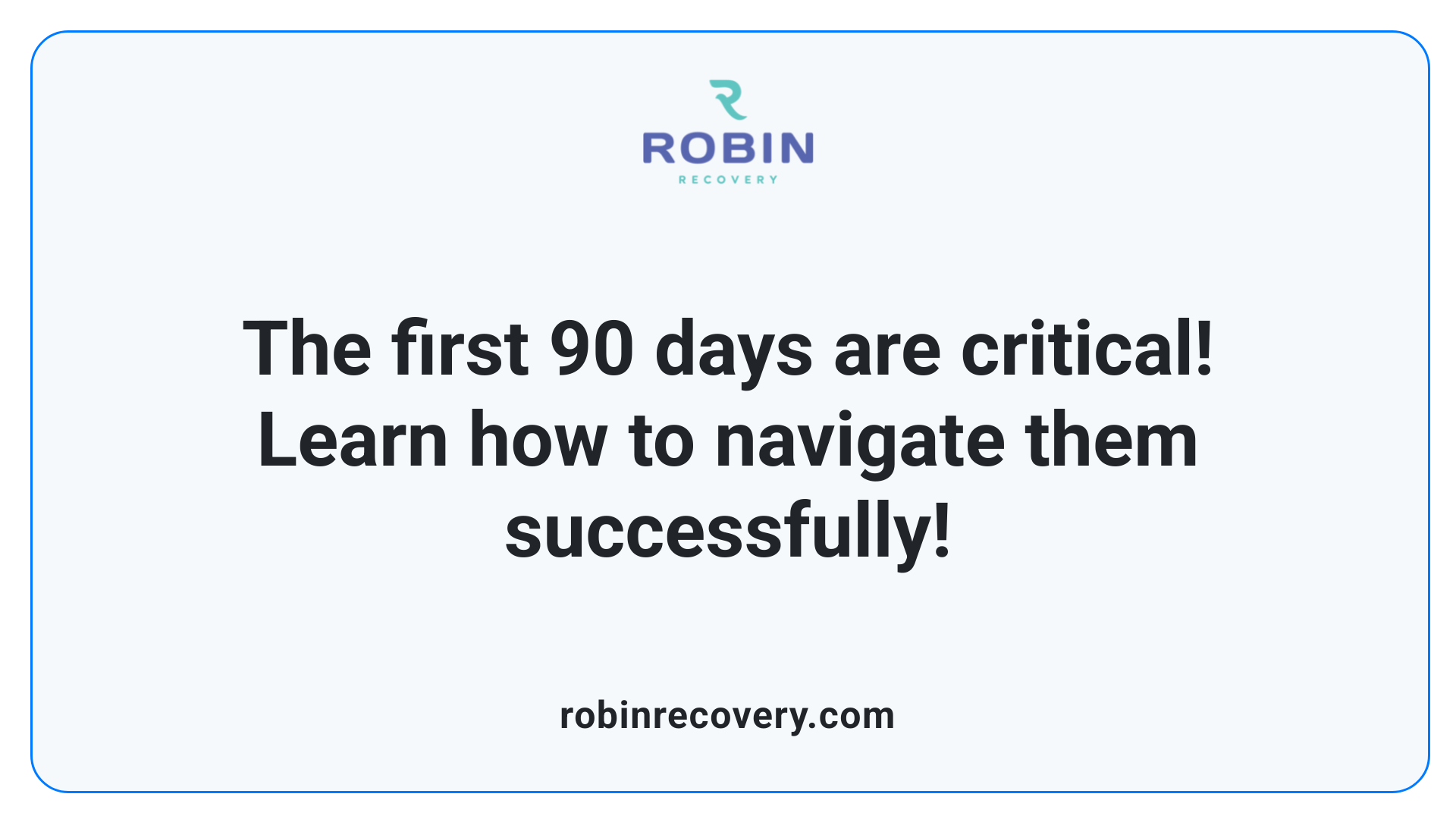
What is important to know about the first 90 days of sobriety?
The initial 90 days of sobriety are often considered the most crucial timeframe in recovery. Referred to colloquially as the "danger zone," this period presents unique challenges but also opportunities for establishing a stable base for long-term recovery.
During the first month, individuals typically undergo medical detox. This process, while intense, is essential for clearing substances from the body and beginning the healing process. It's vital to be aware that detox can surface cravings and emotional upheavals that need support from medical professionals and recovery counselors.
Following the detox phase, enrollment in residential inpatient programs offers a structured environment that reduces the likelihood of relapse. Those supported through intensive treatment options from days 30 to 90 are more likely to develop healthy coping mechanisms and resilience against triggers.
Challenges and support systems
Surrounding oneself with a robust support system is fundamental for happiness and progress in recovery. Engaging with recovery groups, such as Alcoholics Anonymous (AA) or SMART Recovery, creates a sense of community where individuals can share experiences and foster lasting friendships based on mutual understanding. This connection is essential for combatting feelings of isolation often faced in early sobriety.
Building healthy habits during initial recovery
Establishing daily routines significantly contributes to emotional well-being during early recovery. Prioritizing self-care, including nutritious eating, regular exercise, and mindfulness practices, helps rebuild physical and mental health, allowing individuals to rediscover joy in everyday activities. Finding new hobbies, connecting with old passions, or volunteering can also enhance feelings of fulfillment and purpose while countering the risk of boredom or discontent.
Ultimately, by nurturing supportive relationships and focusing on positive habits, individuals are better equipped to navigate the early stages of sobriety, laying the groundwork for long-term happiness and recovery success.
Navigating the Recovery Journey: The 3 P's
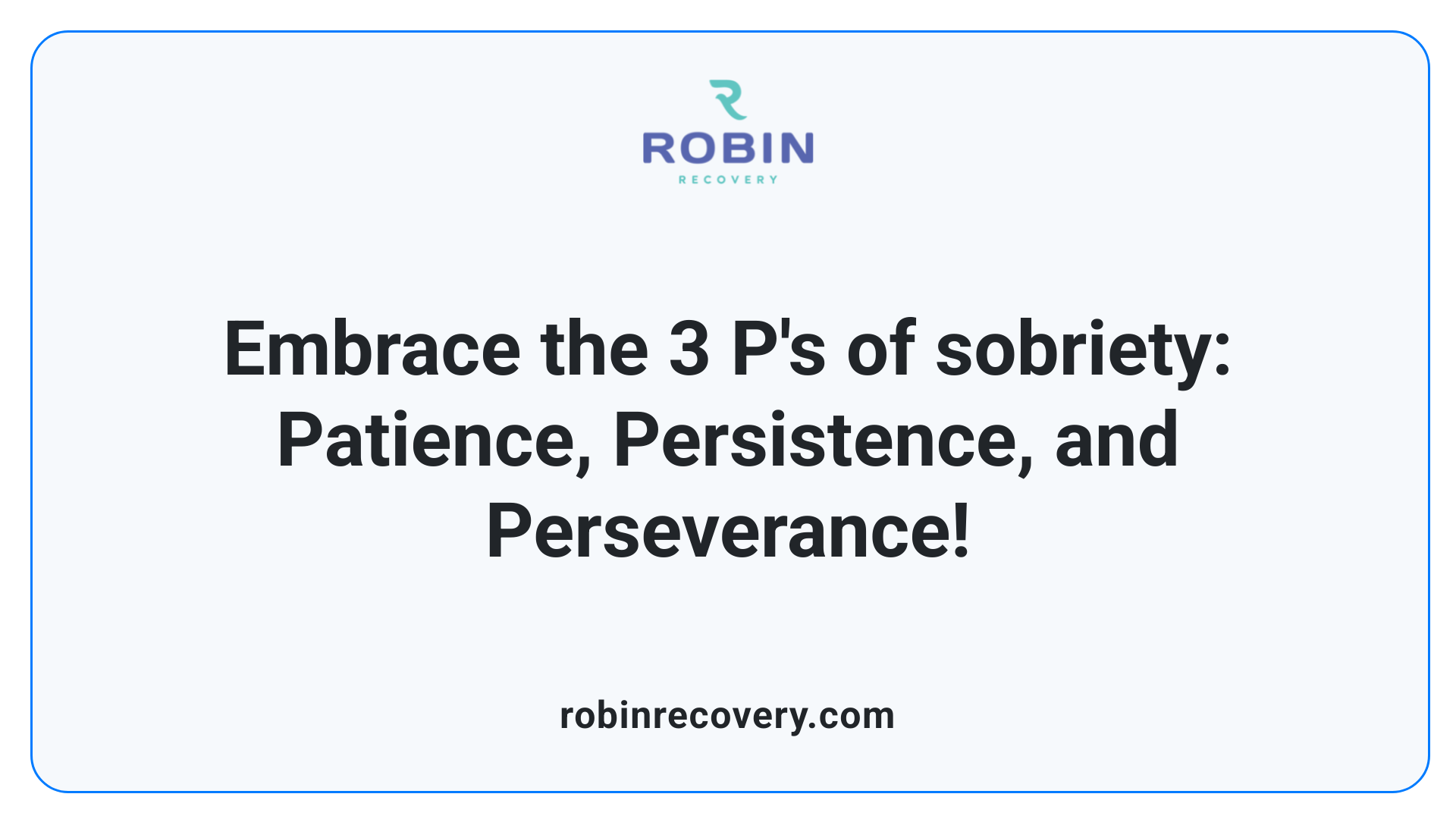
What are the '3 P's of sobriety and why are they important?
The '3 P's' of sobriety—patience, persistence, and perseverance—are fundamental to the recovery journey.
Patience is crucial as it helps individuals accept that healing is a slow process. Allowing oneself the grace to grow step by step encourages self-compassion, rather than frustration over perceived slow progress.
Persistence is the motivating force behind recovery. It empowers individuals to face obstacles head-on, helping them stay focused on their recovery goals despite setbacks. A persistent attitude fosters a belief in the possibility of change.
Perseverance drives individuals to remain committed to their health ambitions even when life gets tough. It's the energy that propels them forward, reinforcing their determination to overcome obstacles for long-term sobriety.
These qualities are not just helpful; they are essential for successfully navigating the ups and downs of recovery.
Reclaiming Passion Through New Interests
Exploring Old and New Hobbies
Rediscovering hobbies that may have fallen by the wayside during addiction is fundamental to finding joy in recovery. Individuals often find that activities such as painting, playing a musical instrument, or even cooking can rekindle a sense of purpose. Exploring new hobbies can also be invigorating, offering a chance to learn something entirely different, whether it’s gardening, woodworking, or taking up a sport.
Role of Creative Outlets
Creative outlets play a significant role in emotional healing. Engaging in arts and crafts can unleash pent-up feelings and serve as a positive distraction from negative thoughts. Not only do these activities provide joy, but they can also enhance self-esteem as individuals see their skills develop over time.
Connecting with Community Through Hobbies
Joining classes or groups that cater to specific hobbies fosters connection with like-minded individuals, providing support while pursuing joy. These interactions can lead to friendships based on shared interests, as opposed to past substance-related connections. Cultivating a sense of community enriches the recovery experience and promotes sustained happiness. In this supportive environment, individuals can celebrate small victories and take comfort in knowing they are not alone in their journey.
Integrating Mindfulness and Gratitude Practices
Practicing Mindfulness
Mindfulness is a powerful practice for individuals in recovery. It encourages living in the present, helping people sit with their inner feelings and experience peace. Mindfulness techniques, such as meditation and deep breathing, allow individuals to acknowledge their thoughts without judgment, aiding in the release of old habits and negative patterns. This self-awareness is essential for navigating the recovery journey.
Benefits of Gratitude
Gratitude goes hand-in-hand with mindfulness. Recognizing and appreciating the positive aspects of life enhances emotional health, providing upliftment during challenging times. Keeping a gratitude journal, for instance, can remind individuals of their progress and reasons to be thankful, reinforcing a positive mindset.
Reducing Stress and Enhancing Positivity
Integrating both practices into daily routines can significantly reduce stress levels and improve overall positivity. Mindfulness helps cultivate a sense of calmness, while gratitude shifts focus from what’s lacking in life to what is already present and good. Together, they foster a balance that is crucial for sustaining happiness during recovery.
Building Supportive Relationships and Community Connections
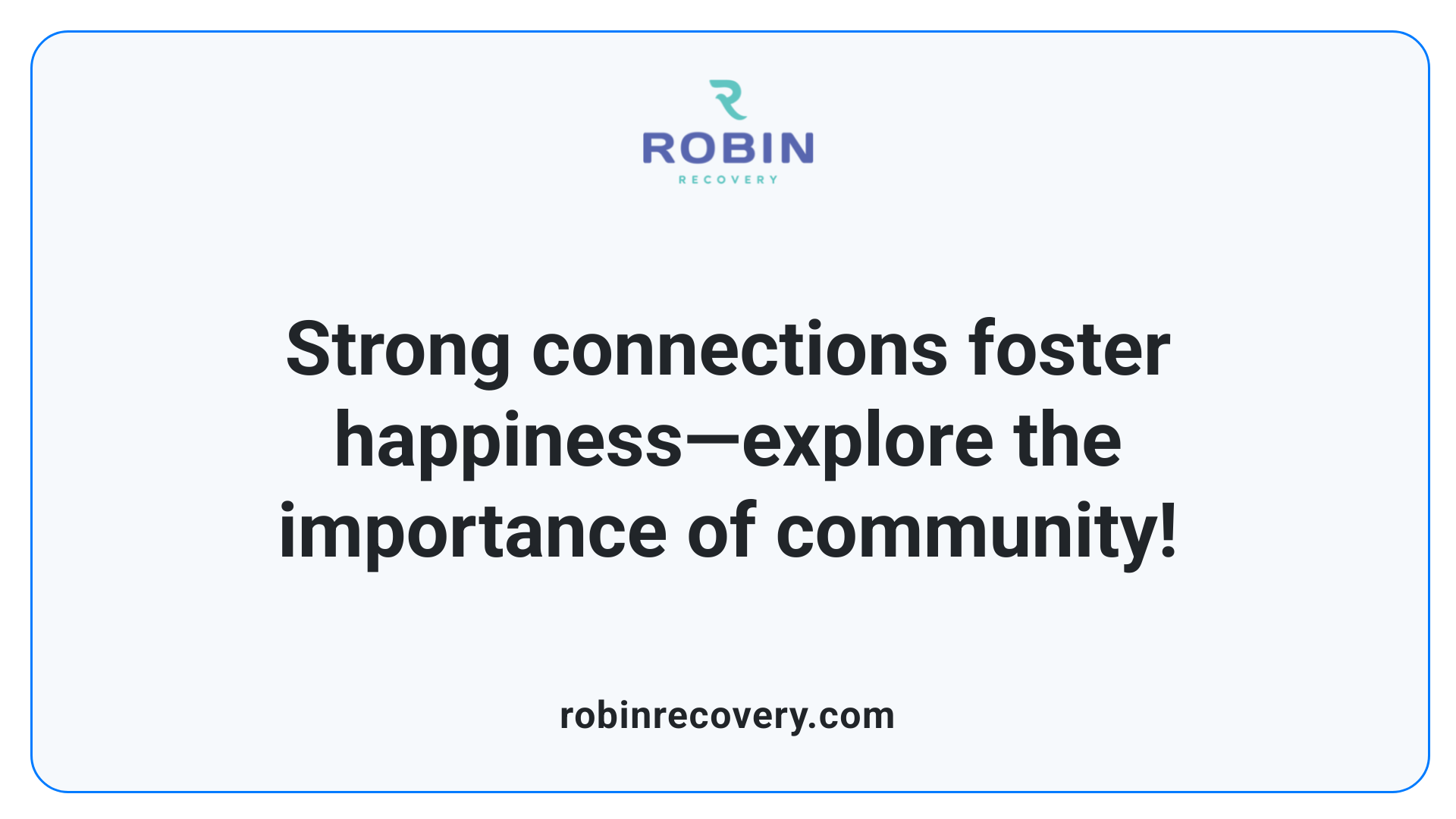
Reconnecting with Loved Ones
In recovery, rekindling bonds with loved ones is vital. This process not only fosters emotional support but also helps individuals feel connected and valued. Building healthier relationships can lead to shared experiences that promote growth, trust, and joy, enhancing overall well-being.
Joining Recovery Groups
Participating in recovery groups like Alcoholics Anonymous (AA) or SMART Recovery is essential. These communities provide camaraderie and understanding from those who share similar experiences, encouraging meaningful connections. Members often develop friendships that replace previous substance-related habits with supportive interactions.
Social Contributions Through Volunteering
Engaging in social contributions through volunteering can significantly enhance happiness in recovery. Helping others not only creates a sense of purpose but also builds a supportive network. Volunteering can lead to friendships based on mutual respect and shared values, reinforcing a positive outlook and connection to the community.
| Community Activity | Benefits | Impact on Recovery |
|---|---|---|
| Reconnecting with family | Emotional support and joy | Strengthens ties and reduces feelings of loneliness |
| Joining recovery groups | Shared experiences, understanding | Builds community and promotes lasting sobriety |
| Volunteering | Sense of purpose and fulfillment | Enhances self-worth while connecting with others |
Conclusion
Sobriety opens doors to an enriched and joyful life. By integrating holistic self-care strategies, mindfulness, and meaningful social connections, individuals can not only overcome addiction but thrive in a new, fulfilling existence. Embracing the journey and consistently working towards personal growth ensures that sobriety becomes a source of true joy and fulfillment.
References
- Finding Joy in Recovery | Ashley Addiction Treatment
- Finding happiness, gratitude in sobriety - Mayo Clinic Health System
- Finding Joy in Sobriety: Reclaim Your Life and Find Happiness
- Regaining Joy in Recovery: How To Be Happy Sober - Ria Health
- How to Find Joy in Sobriety - Pathways Recovery Center
- A 2024 Guide to Finding Everyday Joy in Recovery
- How to Find Happiness In Recovery
- The Importance of Hobbies in Addiction Recovery | Silver Ridge
- 257 - Finding Joy In Sobriety - Soberful
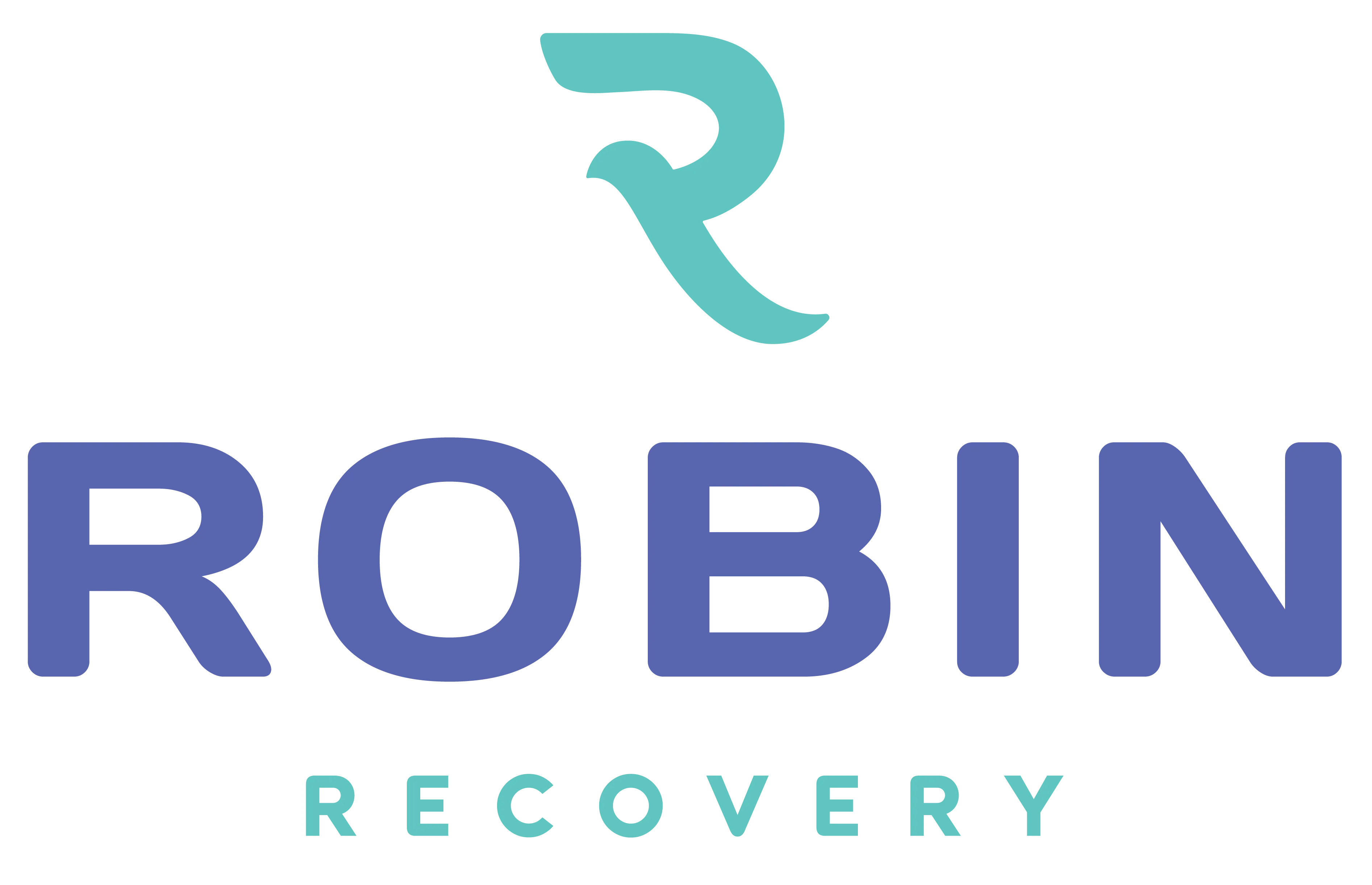
.svg)

.svg)

.svg)
.svg)






































































































